Reviews
These reviews are generally published first on Booklikes, but are also reproduced here and on goodreads. The reviews here contain links to other relevant reviews, links on wikipedia, goodreads and elsewhere. Some links will take you to amazon.co.uk and include my amazon associate id. If you use these links to purchase books, a small percentage of the price you pay will be passed on to me, and will go towards the maintenance of this site. If you do not wish to do this, it makes no difference to the price you pay. However, some charities, educational institutes and other worthy bodies also make use of amazon associate ids to raise funds, and you may prefer to support such. To date, I have received zero income by this method, and I'm OK with that.
Memory of Water
Memory of Water by Emmi Itäranta
Reviewed: 2015-01-06, 17:22, My Rating: 4.0 out of 5, review contains spoilers: No

What a find! Amazon's correlation algorithms triumph and find a book that is a cut above the typical YA dystopia.
It's also going to be a difficult one to review without spoilers - there are several classic books I'd love to compare it with - favourably - and I can't, because that would give the game away.
In an interim post, I referred to the book as a trap closing. I read the book knowing almost from the start that some key characters were not going to make it to the end. The hints are strong, they are there for the reader to pick up, and if you miss those, you'll miss a lot of the tension.
The novel is set in a future time, post ecological failure, and a lot of technology has been lost, and its incomprehensible remnants are to be found in landfill sites. Here the two protagonists find hints that some of the world might not be so bleak, beyond the borders of a thinly-disguised Chinese hydraulic empire. If you're not familiar with the term - see wikipedia .
Being set in a true hydraulic empire, there is very little chance of internal rebellion succeeding - the very stuff of life is controlled by the elite - only a sufficient alternative supply can power a rebellion. Water crime is punished by death. The novel shows how these two combine to create intolerable pressure on ordinary people to become complicit in acts that they would ordinarily find abhorrent - it is a strength that the characters in the novel are flawed and anguished, rather than entirely virtuous or entirely evil.
Thus the novel builds its tension not through action, but by balancing the need to escape to discover if the lost lands have recovered, and the need for slow, careful preparation, limited also by the slow pace at which information about the lost lands can be uncovered. Against this backdrop, the military steadily increase their oppression of the populace, driving collaboration and betrayal through the need for water. You can see the trap closing, yet you can also see why the protagonists are forced to remain within the jaws 'just a little longer, then we'll flee'.
The slowness of the novel might be a sticking point for some - it took a while for it to become apparent where the novel was going. The novel is quite short, too. It feels like you're almost at the halfway mark before the journey-pattern becomes defined.
Technology thoughts. Perhaps a bit too pat, the way the CDs and the technology to play them get unearthed. The pods - used for sending messages - it took a while for me to understand the rules for pods (how the were used, what they could and could not do).
I've left the best till last. The language and the poetry thereof really lift this out of the commonplace. You can pick your own favourites, but I love the way writers like Bradbury, Zelazny and Simak can build concoctions of mood and image with their word mastery. Emmi Itäranta could hold her head up in such company.
It's not perfect, but it's dam' good and as my thoughts turn to candidates for the SFWA Norton (the "YA Nebula"), this is one I'll push.
Memory of Water on AmazonMidnight review
Midnight Robber by Nalo Hopkinson
Reviewed: 2014-12-30, 02:15, My Rating: 3.5 out of 5, review contains spoilers: No
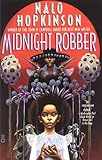
In the end, there's probably not too much to add to my interim post on Midnight Robber.
Certainly there were no real surprises to the ending. Tan-Tan passes through not-nice back to a character I cared about, and matures. The ending is fitting, and earned.
The book is written in Jamaican patois. Not having read the physical book, I have no idea how well it reads - it might take a lot of getting used to - but in the audiobook, Robin Miles does a fantastic job of rendering it comprehensible.
So many times I was reminded of Neil Gaiman's Anansi Boys (which I really ought to get round to reviewing). There's a lot of shared background, including the Anansi mythology on which both build in their different ways. Both are lightly seasoned with folk tales - Anansi stories/Tan-Tan stories - though I have to say that some of the Tan-Tan stories rambled rather too much to hold my attention - that is responsible for the loss of a star.
Not mentioned in my interim post were the aliens. They were well drawn for the most part, though at times a little black or white in their roles. At the risk of simplifying too much, their role was predominantly that of the Native Americans - certainly it wasn't hard to find analogues for a Tonto figure, though I would not say that the Midnight Robber was always the Lone Ranger.
I remain sceptical that enough YA readers would push through the Tan-Tan aged seven chapters, and the descriptions of abuse definitely rule the book out for middle-grade readers. The book asks its readers to empathise with characters across a wide spectrum of ages, which lifts it above the common herd of YA books, but does make it harder to pigeonhole. That makes it a good choice for adventurous readers - of all ages - not looking clones of the latest fad.
So overall a rather more uneven and less mature work than Sister Mine , but Nalo Hopkinson remains an author whose oeuvre I will continue to explore.
Midnight Robber on AmazonSome justice to the hype
Ancillary Justice by Ann Leckie
Reviewed: 2014-11-18, 21:31, My Rating: 3.5 out of 5, review contains spoilers: No
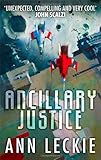
In my interim post on this (audio)book I praised the narrator (Adjoa Andoh), commented on the uneven pace of the two timelines, and the gender ambiguity. This latter actually ended up delivering a perception of an all-female cast, despite the occasional reminders that this was not the case. It might be an interesting exercise to read the book, to see if this still comes through, but, meh.
The timelines did eventually converge and the story assumed the guise of a fairly routine space opera, without the cleverness of writing the distributed viewpoint to sustain it. It was rather less convoluted than a typical Ian M Banks story or an Alastair Reynolds tale, but this is her debut at novel length, so probably to be expected.
There's a super-weapon in there - we're saved from the infodump on how it works (Clarke's 3rd Law applies ) until the very end. There's a Jekyll and Hyde opponent, and a rather unsatisfactory showdown, given that we know in a firefight how deadly Breq (the protagonist) is.
There is then a chapter of picking up the pieces, in which the dictator chooses to keep her conscience armed, which Van Vogt-ian act saves the novel from a pedestrian 2.5- or 3-star rating.
Ancillary Justice on AmazonHollow, hollow, hollow
Hollow World by Michael J Sullivan
Reviewed: 2014-10-30, 01:59, My Rating: 3.0 out of 5, review contains spoilers: No
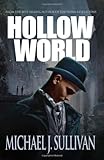
Michael J Sullivan is a new author to me - an Amazon recommendation when I was hunting for Kindle/Audible pairings. He's achieved trad published and self-published books - unusually this one was crowd funded, which allowed him to pay for professional external editing and audiobook production under his own control.
In many ways that has worked well - the narrator (Jonathan Davis) is good and the text he's reading is sound, editing-wise. Infodumps were few and far between. So the mechanics are good.
What about the story, then? It took me on an interesting journey, with a sympathetic, but far-from-perfect protagonist, Ellis Rogers. Ellis grows along the way, experiences loss and healing, learns to outgrow his prejudices and in most ways becomes a better human being. He also saves the world.
The book is reminiscent of Heinlein's The Door into Summer , which I intend as a compliment. Except that there isn't a cat, and Ellis is, if anything, a dog person. Oh well...
Hollow World is themed around time travel, which is Sullivan's primary "what-if". Unlike The Door into Summer, it's one way. That moves it into the Rip Van Winkle territory, so perhaps the what-if is "here's humanity, two thousand years in the future. It's different."
Ellis Rogers builds a time machine in his garage, is diagnosed with an incurable disease, and pushes the button. Arriving not quite when he expected, he stumbles straight into a murder, then meets Pax, whom we realise pretty quickly is going to be a major character.
Pax is an arbitrator, so by my reckoning ought to be able to persuade people. However, his main technique seems to be to say "X is true. I can't tell you how I know. Trust me."
This happens often enough that it becomes obvious that Sullivan is hiding a key plot element from the reader. For me, that breaks the rules of mystery writing - you don't point to the locked box and say "the solution lies within, but I the author am just going to tantalise you until it suits me to reveal what I have concealed therein." For the sake of balance, I will admit that he does provide clues as to what might be in the box (and I guessed right). But a good mystery novel works by hiding the truth in plain sight, then surrounding it with misdirection. Sleight of hand, not stonewalling.
I said I guessed right about the contents of the metaphorical box containing the key plot element. I'm afraid that it was a disappointment, in that it added yet another what-if, which breaks the rules of sci-fi - you make one major change to reality only.
Pax says "I can't tell you how I know - trust me" once too often, loses the trust of Ellis Rogers, and vanishes. Thereafter Ellis is on his own, taken in by the plausible lies of those about him, while I the reader am seriously considering a DNF on this, despite the excellent world-building and a lovable-but-annoying AI. The villains are too obvious, and Ellis' stubborn refusal to believe ill of his friend became seriously irritating. Again, there's lots of hand-waving by the author, and you know he's hiding stuff.
Finally the nature of the plot is revealed and it turns out that Hollow World has a single point of failure - really? They have Maker technology that can transmute elements and turn out pre-charged batteries of near-limitless power - and yet the villains decide to employ a twentieth-century device as their weapon - really? And that business of teleporting (yet another what-if) the weapons out into interstellar space? Umm, you're in the core of the planet, surrounded by molten rock - just dropping the things into the molten rock is quite sufficient to render the most powerful of weapons quite ineffective - if you don't believe me, ask Frodo.
Finally, I have to believe that Sullivan's tongue was firmly in cheek when he engineered a thrilling race against time, and maker-equipped Ellis with a digital watch so we could have a countdown in the movie version.
There is good in the book - the world-building - and bad - the physics - and ugly - the breaking of literary conventions. So I did finish the book, and it did take me with Ellis on a journey to a pat ending.
But the stuff I had to put up with along the way...
Hollow World on AmazonThe listener will nae take it, top o' the mornin', begorrah
The Mote in God's Eye by Larry Niven and Jerry Pournelle
Reviewed: 2014-10-29, 20:21, My Rating: 3.5 out of 5, review contains spoilers: No

I need to be clear that I'm reviewing the audiobook here - in print or ebook this title would fare at least one star better.
L J Ganser, the narrator, has done this book no favours whatsoever. I can just about put up with his pronunciation of Murchison, which he chooses to rhyme with murk rather than church. I can cope with the odd word rhythms, the lurches that telegraph that he's unfamiliar with the text, and the awkward elisions between vocal characterisations as he realises he's started in the voice of the wrong character.
But his Scottish accent is appalling. There are some key characters who are supposed to be Scottish, but they end up sliding into (southern) Irish as often as not. The stress and the rhythms are all wrong, and mostly it's the word "hae", which he pronounces "hay" with emphasis, rather than unstressed. I'm not sure he knows what it means or if he even realises it's a verb. It doesn't get any better, either. It's a sore that never heals from one end of the book to the other. Maybe a US listener wouldn't notice, but to a British ear it sounds false, stilted and amateurish from beginning to end.
OK, rant over.
As I'm finding more and more, having reactivated my Audible subscription, an audiobook is a significantly different sensory experience to reading. It's an interpretation, for one thing, like a cover version of a treasured song, which can throw up some real surprises. My most common reaction is either "I will never listen to anything by this reader ever again" or (less often) "I will seek out other audiobooks read by this reader, simply for the pleasure of listening to a master at work" - or its variant "I would like this reader to narrate my novel" ;-). Peter Kenny falls into the latter category - sadly L J Ganser has joined John Lee in the former category.
The other aspect of an audiobook is the pace. I can (and usually do) read the printed word at least twice as fast as a good narrator would read the same book. The slower pace of an audiobook exposes the tiny details of language, but also gives the listener more time to concentrate on details of plot and characterisation. This may or may not be a good thing.
In this case it is not a good thing. L J Ganser has shone a very bright light on a book I used to love without reservation, and I have seen some ugly flaws.
First among these is the character of Sally. In print, I saw Sally as a welcome female presence in an otherwise male-dominated book. When I listen, she becomes a cipher, with only two purposes - to provide a sympathetic voice to insist on the Moties' peacefulness (balancing the unsympathetic Horvath's equally pro-Motie viewpoint) and to provide a "strong female character" and love interest for Rod Blaine. Perhaps the book is a child of its time, but Sally shows a future that has regressed to the 1950s in its attitude to women. She is there to create polarisation of opinion, to hamper the Moties-are-dangerous faction, building tension until the book's final revelations. In order to give Sally the clout to do this, the authors have made her an anthropologist, and it's frightening to hear how little scholarly detachment she has from her subject of study.
To a lesser extent, similar criticisms can be levelled at all of the characters in the book - Renner, Potter, Kutuzov, Staley - they exist to exercise specific functions, to provide nudges, threats, irreverence or whatever. They are created to fulfil specific plot purposes and their characterisations don't stray one iota beyond what is necessary to achieve that.
Which leaves the Moties.
They remain some of the best aliens ever crafted by science fiction. They manage to be both sympathetic and alien - their motivations are cleverly dictated by their biology - and they have their superiorities and weaknesses. They have good intentions towards the humans, but they know themselves too well and know how they'll act in a crunch. In some tragedies the characters hurtle towards their doom ignorant of the forces that drive them. The Moties are Macbeth plus Myers-Briggs.
High tragedy.
The Mote in God's Eye on AmazonWas game, now thrown
A Game of Thrones by George R R Martin
Reviewed: 2014-10-03, 08:57, My Rating: 3.0 out of 5, review contains spoilers: No
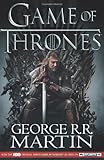
I had high hopes for this - lots of enthusiasm on book sites. I read a few chapters, got inside the heads of a few characters. Fine. Then I watched the first episode - it all tallied.
No more gore than normal for the genre. The sex likewise.
But I've lost interest.
I think the problem is that even in this first book the book is too consciously plotted. I can see the hand of the author everywhere; whenever he gets the chance to turn the screws, he does. I've stopped investing any effort in learning about the minor characters - they're pure cannon fodder.
There are no real surprises anymore. It's just fantasy soap-opera, with well-scheduled climaxes. I've read enough like this not to need to read another one. And certainly no desire to read another six, which I gather is the author's current plan.
It's not bad, by any means. It's well-written. The main characters are well drawn. But I happen to think that a novel should be a journey, not a maze of twisty little passages, all alike.
A Game of Thrones on AmazonDon't listen to the last chapter while driving...
The Book Thief by Marcus Zusak
Reviewed: 2014-08-12, 13:05, My Rating: 5.0 out of 5, review contains spoilers: No

Big mistake. I teared-up during the last chapter - happy tears and sad tears. Narrow, twisty country lanes, but not much traffic coming the other way, fortunately, so I arrived at work in one piece.
I've read the book before (and seen the film, which wasn't bad at all, though necessarily lacked the intensity of the book), so there weren't really any plot surprises when I chose the Audible audiobook for my daily commute.
Except that Allan Corduner's reading brought the book alive all over again for me. His accent is very good with only a very few mispronunciations of the German sprinkled though the text.
When I hear an audiobook rendered this well, I catch all the little nuances of the text that I often miss when reading. The pace and the individual rendering of the narration was such that every character was filled out beautifully - even the minor characters I grew to love, and the loss of each and every one left a hole.
If you didn't get this book on paper, or wondered what all the fuss was about with the movie, then maybe you should try this audiobook.
Just ... park up somewhere safe when you reach the last chapter. Tissues might be useful, too.
The Book Thief on AmazonFollowing in the footprints of giants
The Night of the Triffids by Simon Clark
Reviewed: 2014-07-29, 20:48, My Rating: 3.0 out of 5, review contains spoilers: No
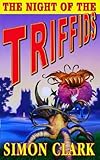
So what happened after Bill Masen escaped the clutches of the despotic Torrence and fled to the Isle of Wight? I always wondered...
Having recently revisited the Day of the Triffids on audiobook and reviewed it here, I stumbled across this sequel by Simon Clark and ordered it up from Amazon.
Hmm.
The Night of the Triffids ends up being an entirely serviceable SF adventure, but it doesn't break any new ground. The whole thing is far too pat - the villains are black-hearted, the heroes are unequivocally good, and rather naive. The triffids lack the scariness of the original, save in the opening pages. They are too easily defeated and the new variants, though novel, are ultimately no more threatening than the originals.
I got the feeling that the novel was written specifically for the American market, and with 21st century political correctness built in, as the Native Americans replay their Thanksgiving generosity of spirit, while Clark plays out the consequences of the circa 1950s apocalypse locking white American New York into a pre-NAACP white supremacist stereotype.
Somewhere in the mix there's a trace of Wyndham's conflict of moral ideologies, but they're an afterthought - given Wyndham's exploration of polygamous alternatives, it's disappointing that the protagonists' relationships are all monogamous and heterosexual.
No - this is simply an adventure story. It's "nice" that Clark has taken the trouble to tell us one vision of how the triffid universe might have unfolded. I'm not sure Wyndham would have approved.
The Night of the Triffids on AmazonWhat's 7 feet tall, green, deadly and hides in bushes?
The Day of the Triffids by John Wyndham
Reviewed: 2014-07-18, 00:55, My Rating: 3.5 out of 5, review contains spoilers: No

Well, a triffid, of course. When I encountered them first, aged eleven or so, they had a scariness value of at least a Dalek. The Day of the Triffids is a book I read many times, so that now, listening to the audiobook (well-narrated on the whole by Samuel West), I mostly recollected the text just ahead of the narrator reading it.
(The one complaint re West's narration is the voice of Josella, which came across older and whinier than I liked. Otherwise well paced, well modulated, clear and an all-round delight to listen to.)
For a book originally published in 1951 it's aged reasonably well. I did observe how the unfolding of the apocalypse was so dependent on the precise level of technology. A few years later, and the same catastrophe would have unfolded very differently as different aspects of society became more (or less) centralised. So much - in 1951 - seemed to fail the moment the human hand let go the tiller. Phones, electricity failed instantly. I'm not convinced.
Likewise, the speed with which the human race is whittled down (and tidily removed from the stage by a plague and the triffids) seems more of a plot device to reduce the visible conflict to man versus triffid, than it is a plausible exposition of how a civilisation might fall.
Its strength, I feel, is more in homing in on the moral choices that the characters make and on the nature of each morality, right only in relation to the society of the time. These, more than man-vs-triffid, are the interesting conflicts - the triffids are there simply to carry out sentence on those who fail to update their moral outlook to a new reality.
Once those conflicting moralities have competed one against another, Wyndham is done. He sketches a quick message of hope for the survivors who have adapted, and wraps up the tale in rather hurried fashion.
As a footnote, I was intrigued to discover, as I sat down to write this review, that Simon Clark penned a sequel - The Night of the Triffids - in 2001. Amazon has obliged...
The Day of the Triffids on AmazonPoddy and Me
Podkayne of Mars by Robert A. Heinlein
Reviewed: 2014-06-08, 14:48, My Rating: 3.5 out of 5, review contains spoilers: No
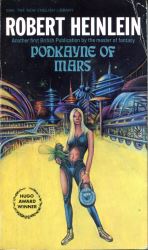
It's possibly half a lifetime since I last read this book, an old edition with the upbeat ending forced on Heinlein by his publisher.
I didn't realise quite how deeply this book had sunk into my hindbrain. Re-reading it after at least two decades, I can see its footprints all over my writing, and particularly upon the style I adopted for Expiration Day . It's quite spooky.
So I'm not sure how this review will work out. On the one hand, the book is a favourite, one of the key building blocks of who I am as a writer. So there's an intensely personal aspect to the review - how could I not love it and give it five stars? On the other hand, it is a "period piece", dating from the early sixties, predating the whole women's emancipation movement of that decade. Anticipating it too, perhaps, but incompletely.
Podakayne is a teen who wants to be a space pilot in a future where this is still seen as a male-dominated profession. Humanity is still locked within the solar system, but a solar system with colonies on Mars and Venus, the major moons and asteroids. The Venus is that favourite - hot, teeming with life, life bristling with sharp teeth - and owned by a single corporation (think the Venus of The Space Merchants meets the Mars of the film Total Recall).
It's quite short, as a book, and rather too much of it is Poddy's Adventures in Space, where Podkayne Meets Interesting People and Has Adventures. There are Lots of Capitals for emphasis of Important Points, because the book is written as Poddy's Journal and that's what Poddy Does. It gets a bit wearing, as does the story - the danger is fairly nominal.
Even once arrived on Venus, it's a rich girl's tour - money is no object, she's escorted by the handsome and well-connected Dexter, the son of the corporation's senior executive. She doesn't even have to fight him off very hard - chivalry is Dexter's middle name, though he makes it very clear what he's interested in. There's a lot of the mindset of pre-liberation, pre-contraception times, where a woman had to "protect her virtue". Such a notion would baffle modern readers - it's as atavistic as finding the Bronte sisters writing YA/SF.
Only in the last few chapters does the dream come crashing down in a hasty ending, with a dark villain, only prevented from twirling the moustache in an evil manner by dint of being an elderly female. Then, in short order, the villainess is defeated to either an upbeat or a tragic outcome, depending on which version of the book you pick up.
I still love this book for many reasons, most of which have no validity outside my skull. Judging against what else was available for the proto-YA reader at the time, it's probably at least a head, possibly shoulders too, above the rest. Judging by today's standards, however, it would be lucky to get two stars.
On the grounds that books should be judged at least partly in the context of its own time, not solely on how it works today, I'll be more generous.
Podkayne of Mars on AmazonGarba - dale
The Steep Approach to Garbadale by Iain Banks
Reviewed: 2014-06-06, 01:07, My Rating: 3.0 out of 5, review contains spoilers: No
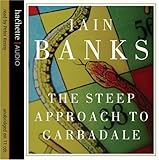
Mostly positives here.
It was an audiobook, narrated by the excellent Peter Kenny, which is a good start point. Versatile range of accents, making the characters instantly recognisable, because he's just so consistent.
A nicely convoluted plot around a sprawling wealthy family, the clan Wopuld, complete with black sheep, set against the background of a bid by a US games corporation to buy out the family firm. A powerful (but aging) matriarch, devious and unscrupulous. Skulduggery. Some well-concealed plot twists. Teenage lust ā la Adrian Mole turning to middle-aged angst in the mostly-sympathetic protagonist, Alban McGill. Some lovely comedy from aunts Beryl and Doris.
Some negatives, though.
Many of the characters are stereotypes - Fielding, for example, and Cousin Sophie (the object of Alban's teenage lust). They lack depth, though you might defend this on the grounds that the tale is told from Alban's point of view, and the narrative reflects that Alban never really tried to understand his relatives. Even Sophie, whom he never sees as more than the object of his sexual desires.
The story takes a while to get going. The first chapter almost lost me - we meet Fielding first of all and there's no empathy - he's just a wealthy businessman, thrust into a Scottish slum, petrified that his car will be stolen (or keyed).
But then the first plot twist - he's agin the takeover. Suddenly I like him, and my interest in the book picks up. It drags again though in the following chapters. We get a guided tour of Alban's teenage years, his first meetings with Cousin Sophie, and it becomes very meandering and (as I said) Adrian Molesque. In hindsight, a lot of what happens here feeds into later twists, but at the time it just feels like Iain Banks is indulging in teenage male fantasy.
The final negative is Alban's atheistic rants and introspective musings, which just went on and on at times. It's a facet of many of Banks' writing, normally kept somewhat under control, but here it got downright fiery-preachy, sentences piled one upon another, as Banks restates his beliefs just in case you didn't get it the first time.
The novel gets going again as the moment draws closer when the decision on the sale will have to be made. Interleaved, we learn that there's a mystery that surrounds Alban's birth, and the suicide of his mother. Black sheep, secrets and skulduggery...
The threads all come together reasonable neatly, if a little predictably. There's a nice little coda, too, showing Alban apparently at peace with himself.
In hindsight, it feels like another Espedair Street . That's OK, too.
The Steep Approach to Garbadale on AmazonFair Coin by E C Myers - to toss or not to toss?
Fair Coin (Coin, #1) by E.C. Myers
Reviewed: 2014-06-04, 00:27, My Rating: 3.5 out of 5, review contains spoilers: No
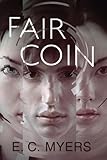
Following on from my recent excursion into the current Nebula crop, my wife asked me to choose some older Nebula winners for her to read. Our choice was influenced by what was available either from the library or cheap on amazon, so this - the 2012 Andre Norton winner - was what came up.
So far the cover blurb has been pretty accurate - a coin that appears to grant every wish, but with side effects that are less desirable. So far, the protag, Ephraim, is using his wishes to sort out his mother's broken life, and a variety of he-loves-her-but-she-loves-somebody-else teen relationships. Hmm.
In that respect the plot is not much different to A Midsummer Night's Dream as Puck manipulates the affections of Demetrius, Lysander, Hermia and Helena. We have Ephraim, Nathan (boys) but 3 girls (Mary, Shelley and Jena). So one of the girls is going to be left out in the cold.
Shakespeare puts the moral responsibility for such choices with Oberon, deeming humans not capable of making wise choices. In Fair Coin, Ephraim is choosing for himself, so his choices reflect a very human selfishness - me first, then my mate; the girls desires don't count much and they are the ones whose affections get manipulated.
So at about the 40% mark Ephraim reaches the danger point - "just one more change to put it all right, and then I'll stop" - where "all right" means "all right for him and for Nathan".
At that point it all changes - there's an infodump which takes the book out of the realm of teenage wish-fulfilment and into something more scientific. It also resolves some hints laid down earlier and gives us an antagonist for Ephraim and his chosen girl(s) to battle against.
The antagonist is strong and knows what's going on, and is totally ruthless (the body count rises), whereas Ephraim is physically weaker, doesn't yet understand the coin, and is showing a highly moral side. It's all down to whether Ephraim and his allies can outsmart the villain.
The science wobbles between the plausibility of the theory and the implausible nature of the technology that implements the physics. In effect the science is cut down for the audience and the technology is simply handwavium with exactly the right properties to let Myers construct his drama.
Which he does very effectively. The wrap-up is neat, displays Ephraim's moral growth (mostly - his disposition of the antagonist is akin to dropping someone in the middle of a minefield and then claiming you're not responsible) with considerable effort to right wrongs (with some comedy along the way) and balance being somewhat messily restored. There's no way to undo the death toll, though, and putting Humpty together again involves some hard choices and some tears.
Pro: the novel rises above being a teenage wish-fulfilment fantasy, and tackles the morality of power. It's a good introduction to aspects of physics, so long as you don't take it too literally. If you do break Humpty Dumpty, the repair is never going to be perfect - that's life.
Con: the second quarter of the book squanders the early empathy built up with Ephraim, up to the point where he finally realises the selfishness of his actions. You have to push through that bit to get to the meat of the book. The technology doesn't match up to the science.
A good read, on balance.
Fair Coin (Coin, #1) on AmazonMad Scientists? -or Historians?
Just One Damned Thing After Another by Jodi Taylor
Reviewed: 2014-05-18, 22:04, My Rating: 3.5 out of 5, review contains spoilers: No
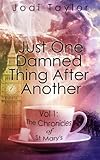
I really liked the dry humour of this one. Instead of mad scientists we get mad historians with time machines, equally able to make things go bang, and living proof that no battle plan _ever_ survives contact with ... reality.
Style-wise it reminded me of Eric Frank Russell, especially his "Men, Martians and Machines ", and perhaps Harry Harrison (Bill, the Galactic Hero ).
It took a while to get through the scene-setting and into some genuine "adventures". I did wonder if it was going to turn into something like Larry Niven's The Flight of the Horse - a succession of themed tales tied together by a technology, some characters and the author's desire to spin some time travel yarns with a bet-you-didn't-see-that-coming ending to each.
But then it changed, and I realised the body count was climbing, and there seemed to be a darker force at work.
At that point I started to read faster, because I was enjoying the story, and that may have been a mistake. I lost track of who the male leads were - I'd been sure the main (female) protag seemed to be involved with just one of them, but I'd forgotten which.
There was the Boss and the Chief - and I think I got it straightened out their respective ranks and specialities, and a variety of characters with names beginning with M. Then the body count climbed further and we suddenly got non-historians roped in, and every male just became a potential redshirt.
An early plot device - the space-time continuum's ability to drop large blocks of stone on top of any historian who threatened to disturb the established timeline - just disappeared in the second half of the book, when it would have become way too inconvenient and would have seriously impeded both the booming villainy and also the heroes' attempts to thwart it.
I loved the story and the style, but the redshirt-nature of the male characters and the lack of rigour to the rules of time travel lose a star and a half.
I shall most likely read the next book in the series.
Just One Damned Thing After Another on AmazonRevelation Space
Revelation Space by Alastair Reynolds
Reviewed: 2014-04-28, 22:14, My Rating: 3.0 out of 5, review contains spoilers: No
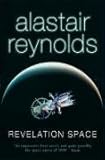
Well, I managed to avoid the DNF on this one, and indeed managed to get back to a point where I rather enjoyed the ride.
I had a couple of possible outcomes for the novel. One in which all the villains and minor characters die, and all the major protagonists survive. The other in which some of the villains get their comeuppance, but by no means all, and in which at least one major character dies, probably saving humanity as far as that is possible. And that's properly dies - none of this reincarnation as an AI nonsense. If I'd been reading Iain M Banks, I wouldn't have bet on either outcome over the other.
I'll avoid the spoiler. Suffice to say I wasn't entirely pleased with Alastair Reynolds' rabbits and hats.
Faults first, and those specific to the audiobook - the narrator (John Lee) is poor.
- The emphasis is practically identical for every sentence - he starts forte then fades to a mezzo piano, almost piano by the end.
- His range of accents is frustratingly small. He has one French accent, which he uses for every inhabitant of one world, regardless of age or gender. The starship crew get a hybrid Russian/Japanese accent, which is somewhat erratic.
- His pauses as he switches between the starship and one or other of the two planets are too short to be worthy of the name. Too many times I find myself a paragraph or two into a new scene before I realise there's been a change, and I have to work out where I am and who is now on stage. Mental rewind - no, missed it. Bah!
General faults:
- "Quadrant 5" - really? Is it no longer a requirement for authors to understand the etymology of the words they use?
- Too much repetition, too many infodumps (sometimes the same infodump repeated for the benefit of a new character who didn't hear the first one).
- The alpha copy of Dan Sylveste - a plot point that wasn't, at least not in this book. A red herring?
- The computer security was inconsistent - lax or strong as the plot needed it.
- Sunstealer's potency or impotency was likewise variable, according to the needs of the plot.
Some positives:
A surprising level of empathy built up with Volyova over time. Likewise Khouri. The descriptions of the light-hugger ship - like the Nostromo, but with intelligent rats, a rotting infrastructure and sludge/slime. However it is not explained how the rats survive the acceleration that kills a rogue crewmember. Nor what happens to all that liquid under the same acceleration.
Still, it is a good adventure, though the ending is just too pat. The audiobook is harder work than it needs to be.
Revelation Space on AmazonThe Android's Dream by John Scalzi.
The Android's Dream by John Scalzi
Reviewed: 2014-04-20, 19:36, My Rating: 3.5 out of 5, review contains spoilers: No

This started off like one of R.A. Lafferty's Retief novels, but then switched gear to a more conventional save-the-planet thriller. It's not quite a comedy, but there is some sassy banter between the leads, Harry and Robin, that sets a lighter tone.
Scalzi has fun with his competing agencies (modelled on the US), complete with competing villains, and his nods to Philip K. Dick and others. There may even be a nod to Heinlein's Stranger in a Strange Land in there.
It's a very net-connected world, somewhat overtaken by events (the notion that IBM will continue be a major computer manufacturer looks ever less plausible), but the cyber-security rings true-ish, being over-simplified for the sake of the plot.
Guns, monsters (well, aliens) with a conscience, heroines with attitude who nevertheless needs rescuing, veterans of a military snafu, AIs, galactic politics are all there. Of the minor charaters, I did like Judge Bufan Nigun Sn, and his refreshing court-room manner.
Weaknesses were few (or at least, minor). The activity at the mall felt contrived, with a sudden piece of new technology that moments later becomes the deus ex machina in the crisis, and marks the transition of Harry into action hero. The flip-flop nature of Robin. The confusing number of villains. The computer technology of the Nidu. Oh, and the hero's name, just begging to be used in a weak joke (it is).
The only other Scalzi novel I've read so far had been Old Man's War , and for me The Android's Dream is more adventurous and more original. That said, while the journey held more surprises, the destination was the usual one. Humanity is once again saved, and a jolly thrilling romp is enjoyed while we get there.
The Android's Dream on AmazonRobot eats her own grandmother - shock!
vN by Madeline Ashby
Reviewed: 2014-04-10, 01:00, My Rating: 3.0 out of 5, review contains spoilers: No
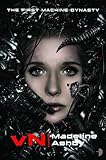
Amy is a robot. Amy eats grandmother. Nice touch.
Amy goes on the run. Amy gets attacked. Amy fights back. Amy gets captured. Amy gets rescued. Loop.
That's somewhat unfair of me, but at one level, that's mostly what happens. She regenerates after injury, which happens a lot. She acquires traits of other robots she eats. She ought to be invincible, and sometimes, when it suits the plot, she is. Other times, she's inexplicably weak, gets captured. Whenever she's about to be eaten, Javier rescues her, even if he appears to have abandoned her / been captured himself. No explanation, just rabbits popping out of hats.
At another level, there's the concept of the self-replicating robot, the failsafe (aka Asimov's 3 laws), the dual vN-human culture, some interesting world building.
In the end, I never built up much sympathy for Amy. For all her power, she is tossed about by events, and reacts rather than initiates. The last 40 pages were a high speed dash for the finish.
vN on AmazonSister Mine (Nebula/Andre Norton Shortlist)
Sister Mine by Nalo Hopkinson
Reviewed: 2014-03-28, 00:30, My Rating: 4.0 out of 5, review contains spoilers: No
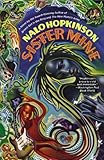
I still don't feel that this is a YA novel, but I'm glad that it's on the Andre Norton shortlist, because it should be enjoyable by anyone.
Makeda, the protagonist, is an outcast, tolerated by her family, lacking in mojo ("magic"), and thus the runt. Even her crippled sister Abby has mojo and the respect of their kind.
For reasons which slowly unfold, no-one has been telling her the truth about her origins, and Makeda has finally decided to break away from her stifling home environment. But her departure coincides with the disruption of the status quo, and the adventure begins.
I'd compare the book to Henry Kuttner's Hogben tales - and I'm sorry if those are a bit obscure but the search will be worthwhile - because Makeda's family have a similarly unconventional feel to the Hogbens. They have been given powers befitting the assistants to the Big Boss, but they're ramshackle and undignified with it. So there's always a faintly humorous tinge to Makeda's dealings with her family.
Makeda is black, but most of the time you wouldn't know it; while Makeda is searching for identity, both her gender and her colour are immaterial 99% of the time. She's just a person, gradually discovering some difficult truths about herself, and trying not to be killed in the process.
I do like Hopkinson's writing, Her descriptions are effective, image-rich and with carefully-selected portmanteau words to make the whole concise. She takes care to trim her language; every word earns its place. And I particularly enjoyed her descriptions of synaesthesia, which reminded me of Zelazny's Amber hellrides.
And I like the storytelling, the careful guarding of the final destination. I don't think all the loose ends get wrapped up, nor do all the steps feel rigorously logical, but the ending is a satisfactory out-working of her parents' love for Makeda and Abby.
In the context of the Andre Norton award, then, Makeda is the right age and maturity for a YA protagonist, and the story is a coming-of-age self-discovery. But Hopkinson has resisted the temptation to bolt on a cardboard hunk for a love interest. There's no conscious bending of the story to fit the standard plots.
I think this is my favourite of all the shortlist; it gets my vote.
Sister Mine on AmazonThe Summer Prince (Nebula/Andre Norton shortlist).
The Summer Prince by Alaya Dawn Johnson
Reviewed: 2014-03-23, 12:39, My Rating: 4.0 out of 5, review contains spoilers: No
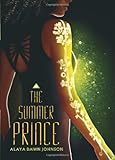
While not free of the tropes of the genre, this book manages to rise above them, striking a mood that is reminiscent of A Wizard of Earthsea, while being utterly different in so many respects.
June, the protagonist, lives in a post-apocalyptic matriarchy, situated in Brazil. She is a talented artist, of the privileged classes, with a hidden side, secretly using her art as protest. If you're British and reading this, think Banksy.
Humanity has fragmented, and her city state is structured, highly controlled in its interactions with other splinters, of whom we get tantalising glimpses. There is a tension in the level of tech - the rulers (the Aunties) keep out the most advanced tech, but there's still tech beyond the current day, upon which June relies for her rebellion.
The political system is out of balance, despite its pretensions, and the novel explores this with one thread, as the iconoclastic Enki - the Summer King whose purpose is to legitimise the matriarchy - lives out his short reign. Enki walks a tightrope, between the letter of the law that made him king, and the spirit of the law that requires him to put the City above obedience to its rulers.
In a conventional YA novel, June and Enki would lead a rebellion against the Aunties, overthrowing them over the course of three novels; certainly at the 75% mark in the novel, I feared it it would sag into the waiting mould.
Fortunately, Johnson transcended such a predictable outcome - and while some readers might claim to predict that outcome, I was careful to let the novel take me where it would, and was pleased and gently surprised by the ending.
It's not strong on tension or conflict; its merits are far more in the richness of the language - I took longer to read the book than many novels of its length because I stayed to enjoy the words, rather than skimming over them to get to the next explosion - and the more subtle nuances of emotion.
Perhaps there is scope for a sequel, but I hope none appears. The novel is beautifully complete as it stands.
The Summer Prince on AmazonWhen We Wake (Nebula/Andre Norton shortlist).
When We Wake by Karen Healey
Reviewed: 2014-03-16, 11:59, My Rating: 3.5 out of 5, review contains spoilers: No
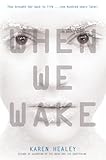
This is my benchmark for the SFWA 2014 Nebula YA category (aka Andre Norton). It's a good start, with an interesting premise, which I don't regard as a spoiler, as it's on the front cover, that the protagonist, Tegan, is brought back to life after being killed and frozen.
The book - set in Australia - falls into 3 parts, with a short part 1, a snapshot of the day she dies and the friends she's about to leave, and some of the skills she may (or may not) need to get her through parts 2 and 3.
Part 2 deals with her arrival in the future, thawed and healed, and her adjustments to the technology and mores of her new home. She finds friends, and enemies, as she tries to integrate into a new school, and the narrative drags here; I wonder where it's all going. But her school is an unconventional one, with highly talented pupils, even the obnoxious ones, and it's here that Tegan assembles her team, providentially with skills that will prove necessary to get safely through part 3. And her love interest.
Part 3 kicks off with the discovery of the military secret that must be revealed to an apparently conscience-less Australia, sitting pretty in a world that coping badly with climate change, pollution and resource shortage. This is where her "team" gets to show off.
It moves quickly from here, and the team play their parts, and fall away. Some are "shot", and with a variety of lethal and non-lethal weaponry about, I'm left in some uncertainty about the finality of these "shootings", wondering whether X or Y has been sonic-shot-incapacitated or traditional-shot-dead. Perhaps the author isn't sure who she's going to bring back at the end, or in the sequel, or maybe it's just sloppiness.
Reading as an adult, I have a big issue with the security, both domestic and military. It's just too easily defeated, if you have the right friend, with the right apps. I have a minor issue with the odd interjections from Tegan's post-denouement self - I'm not sure they add anything. (Hypocrite, I hear my own reviewers call.) And Tegan finds it far too easy to evade her watchers - the military are cast as villains, and acquire the stupidities thereof. The other villains - the religious fanatics - also have a fair measure of villain-stupidity.
Some real plus points, though. Tegan's moderate religious beliefs are treated really sympathetically, and contrast against both the atheism she meets and the religious fanaticism. Likewise, the inclusion of sympathetic (liberal) Muslim characters. And Tegan's cautious attitude to sex and drugs. And to Rock and Roll, too, if you consider Tegan's obsession with the Beatles.
And some good, provocative topics dotted about the novel, too. Climate change. The responsibility of the developed world towards the other nations (the haves and the have-nots). The morality of eating meat, in a climate-challenged world. It's a book that does challenge young adults to make life-choices for the long haul. Better, it does it unobtrusively, in a way that doesn't preach.
In the end, the good points well outweigh the bad, and When We Wake justifies its place on the Nebula voting shortlist.
When We Wake on AmazonBefore I Go To Sleep (While still fresh)...
Before I Go To Sleep by S J Watson
Reviewed: 2014-03-14, 10:13, My Rating: 4.0 out of 5, review contains spoilers: No
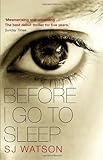
This is a novel that no-one should review.
It is just too easy to write a spoiler, just a word or a phrase, be it as cryptic as you can make it, that will ruin the journey. Unfortunately I read such a spoiler, and cryptic as it was, I knew where the journey would end. Mostly.
Never mind the implausibility of the medical condition, or the very rare slip of perspective; what Watson has done is to craft a slow journey, through the daily journals of Christine, an amnesiac, and her progress towards understanding who she is and how she got there.
Necessarily, Watson takes some liberties with time, compressing events that in reality might not fit into the time available to the protagonist - some of the visits, and the sheer time for Christine to read the journal each day - for the sake of moving the novel on. Even then, Christine's narrative sometimes drags, as she tends to repeat insights from earlier in the day. It is done, I imagine, to give the reader greater insight into her mental processes, and to build the tension, both of which it does, but it hurts the pace.
If you stick with it - I recommend it as an audiobook to fill a long journey - then you shouldn't be disappointed with the ending.
It is apt.
That is all I will say. There are books I could compare it to, such as ...
But no. As I say, I hate spoilers, and this book is too easily spoilt by comparisons.
Before I Go To Sleep on AmazonSpace Opera is in Good Hands.
House of Suns by Alastair Reynolds
Reviewed: 2014-03-13, 00:41, My Rating: 4.5 out of 5, review contains spoilers: No

Having not quite exhausted the Iain M Banks canon, I'd been looking for a new author to try, and found myself wandering round Foyles main bookshop in London, which has a decent-sized SF section. Maybe I'm a snob, but I was looking for something that wasn't obviously number 4 in a 6-book series. Something standalone.
In the end, it was Bernard Cornwell's endorsement on the front cover that swung it for me, and I dived in.
The book is told from 3 points of view - Abigail Gentian, and two of her shatterlings, Purslane and Campion, and it meandered for quite a few chapters, before I got it straight in my head the alternation between Purslane and Campion, and who was who. They seemed interchangeable for a while, as they were companions simply alternating the narrative of the same events, and their voices aren't all that different. Furthermore, having been told they were clones, I jumped to the incorrect conclusion that they were both the same gender, and nothing in the voice of either actually put me straight. I had to mentally rewind a couple of chapters, and practically write it down so I wouldn't forget which was which. I could tell that seeds were being sown in these early chapters, but not much clue as to a destination.
Finally, though, the action kicked off, and the novel really came alive. More details about the shatterlings emerged, through a link-up with a larger group of shatterlings, and I found myself gently reminded of Roger Zelazny's cast of Amber , or Philip Jose Farmer's Gates of Creation crew, both long-time favourites.
Reynolds then sets the shatterlings into conflict, so that the tensions between them all emerge, and true to the spirit of Amber, there are hidden traitors, though not so fully drawn with only a single novel to play with, and a murder. Reynolds doesn't have many shatterlings to play with, but he has no compunction about winnowing them down further.
There then follows a satisfying collection of space battles, unmaskings, one-on-one tussles, misdirections, secret societies and whatnot, and Reynolds is clearly in his element like a magician on stage, revealing each twist with a grin and a flourish.
And finally the end approaches, with just a few pages to learn whether Reynolds will dash our hopes for the protagonists, or fulfil them. I've learned in the space of this book that he's capable of both. But will he show balance? - that indefineable quality where the ending is not predictable, and is definitely not all-lived-happily, but in some measure just and fitting.
Yes, he does.
House of Suns on AmazonNo Such Thing as Perfect (Samantha Wilcoxson)
No Such Thing As Perfect by Samantha Wilcoxson
Reviewed: 2014-03-11, 01:07, My Rating: 3.0 out of 5, review contains spoilers: No

This book was advertised as middle school Christian fiction, and it certainly embodies the norms of that genre. The protagonist is Collette, a Christian teenage girl, struggling with the problems of relating to non-Christians in her school and home environment, having to cope with being attracted to a non-Christian boy in her class, and having to endure the bullying from a rival.
If you were to pick up the book as a non-Christian, however, the title would be a real puzzle, as, from a secular point of view, Collette is irritatingly close to perfect - pretty, intelligent, sympathetic (mostly) and with a strong family supporting her. Only when you get past the exterior and into Collette's mind do you see the less-than-perfect creation that the Christian lives with - full of doubt, too often thinking uncharitably of people, even if somehow you manage to stop the impulse to utter the unkind word or repay mischief with mischief.
The early chapters concentrate on showing Collette's strong relationship with her mother, so that when the crisis comes, and Collette is unable to turn to her mother, her other friends must come to her aid. Fortunately, by then Collette has begun to master her selfish impulses, and her enemies have begun to respond to her _agape_-love.
The book is aimed squarely at reassuring its young, female teenage Christian readership that prayer and Christ-inspired selflessness will triumph over all adversity. Certainly for Collette all ends happily, but if I had to pick out a weakness, it is that it does have such a pat ending. Very few humans, Christians or not, will recognise such a neat-and-tidy life.
So the book belongs firmly with moral fables, demonstrating the ideal, but glossing over the messiness of real life as it makes its point. I imagine it would work in a church youth group, as a read-and-discuss exercise.
So how to rate it? It is what it is - Christian pre-YA fiction - and it would be unfair to judge it against the standards of secular fiction. However, there is some Christian fiction aimed at a more adult market that is genuinely thrilling, where people suffer, and fall from grace, and are sometimes, but not always redeemed. It should be possible to incorporate greater tension, and more uncertainty about the outcome, while still staying true to Christian teaching, and being a better outreach.
My verdict: 3 out of 5 stars.
A final, minor, point. The PDF I read suffered from an irritating inconsistency in typesetting, switching unpredictably between serif and sans-serif fonts. Probably caused by mixing styles and default formatting in the original manuscript, but it could do with a final proofing pass.
No Such Thing As Perfect on AmazonTubeworld?
Neverwhere by Neil Gaiman
Reviewed: 2014-02-21, 14:37, My Rating: 3.5 out of 5, review contains spoilers: No

Why Tubeworld? Because this book reminded me of Discworld , but set in an alternate London, mostly underground. From the blurb - which banged on about the jokey names of the characters - I was expecting a humorous romp around a strange but not-too-threatening fantasy London-with-a-twist, a-la-Pratchett, in mood akin to Hitchhiker's Guide . Or possibly a personal voyage of discovery, like Alice in Wonderland , or Candide .
Instead, I got a thoroughly enjoyable but largely standard adventure, with a dash of romance and those jokey-named characters that might not make sense without having lived there, or at least having access to a Tube map and Google.
What makes it succeed are the characters, though there is some variability there. The main protagonist is not cut from hero cloth, suffering from annoying unheroic ailments, such as spinelessness, vertigo, and occasional bouts of tears - but what can you expect from an office-worker who is out of his depth even in his own world? He does improve, and over the course of the book does manage to do enough things right not to be a total waste of space. And he does start the book by rescuing the heroine.
The real delights, though, are the villains Croup and Vandemar - delightfully, unremittingly, invincibly evil, and with a twinkle in their (or at least Croup's) eye. They're not just villains, though, they're performers, with a steady patter for their audience that may just be their victim, or each other, but comes teasingly close to breaking the fourth wall. They're evil, and unstoppable, and - Discworld reference - reminiscent of Vimes' almost-nemesis Carcer, but with class. Indeed, they'd not be out of place in a Quentin Tarantino movie. Croup and Vandemar know that wearing a suit well is the hallmark of the top-rank assassin.
Ruthlessly, Gaiman kills off one of the early characters, which makes the second killing-off from the hero-party more credible when that happens, and he whittles down the party further, as we grow closer to the finale. So as hidden villains declare themselves, and layers of deception are peeled back, it really does come down to just the two protagonists in chains facing off against the two assassins and their awesomely powerful and somewhat unhinged master.
But the ending is satisfying; balance is restored and the protagonist grows through the experience. Phew!
This is my second Neil Gaiman novel, not up to The Ocean at the End of the Lane by any means, but it does demonstrate humour and versatility, and I shall continue to explore his works.
Neverwhere on AmazonCyborg in the Palace alert.
The Lunar Chronicles: Cinder: 1 by Marissa Meyer
Reviewed: 2014-02-09, 02:25, My Rating: 3.0 out of 5, review contains spoilers: No

It's a fairytale, really. Which is a shame, because the concepts have so much potential.
Meyer understands that robots (or cyborgs, or androids) are only really interesting when they're there as a metaphor for oppressed and downtrodden humans. So she really builds the character of Cinder. You get inside her head, and yes, you can empathise with her. She's human, but enslaved, and we want to see her set free.
Beyond that, though, the other characters are fairytale characters, and I wish Meyer hadn't been so bound by the notion of a dystopian fairytale, because fairytale is mostly what we get and dystopia barely peeps through. Dystopia is peopled by complex characters, in a hundred shades of grey. Instead we get almost pure white or pure black. Kai, the handsome prince, a faintly troubled hero. The Lunar queen, whose name I can't actually recall, but made out of pure evil, and I almost hissed whenever she came on stage. Dr Erland has the role of the Fairy Godmother (with added Vulcan nerve-pinch skills) in case you weren't sure. Most of the characters were like that.
Except Peony. Peony should have been pure Ugly Sister, but she wasn't. Meyer wrote her as a morally weak person, vapid on the whole, but certainly not evil. I pitied her - I'm sure that was intentional - and I wanted a better outcome for her than Peony actually got.
Plot-wise, if you remember it's a fairytale, you won't get too many surprises. I'm sure the final reveal is meant to be obvious to the reader, for the hints are dropped very early and repeated, just in case you didn't spot them.
I won't pretend I saw all the plot twists - Meyer threw in some nice touches - but (like JKR with Harry Potter) Meyer also wrung maximum drama and suspense from having her protagonist not confide in the people who could have helped.
Just once, I really felt Cinder was in peril. It really should have been more, and the obstacles were too-quickly overcome - have you ever got in and out of a palace as easily as Cinder? And carrying weapons, too?
But I'm being unfair. This is a modern fairytale, and taken as such, it is spot-on. There are villains and heroes. There is comedy - poor Cinder - and tragedy - poor several people. There is peril, more often threatened than actual.
Taken as a fairytale, Cinder delivers what's promised, and on that level I don't feel shortchanged. It is entirely selfish of me to wish Meyer had maybe read Neuromancer just before starting this book.
The Lunar Chronicles: Cinder: 1 on AmazonBoneland (Alan Garner)
Boneland (Weirdstone Trilogy 3) by Alan Garner
Reviewed: 2014-02-06, 00:34, My Rating: 4.0 out of 5, review contains spoilers: No

I know it's over a year old now, but I wasn't looking out for it and I missed it. I got the softback, but found I wasn't getting time to read it. So I reactivated my audible.com subscription and started listening to it on my commute. First up, Robert Powell has done a pretty good job of narration, but there's a second point of view narration happening interleaved with Colin's thread, and when Robert Powell's voice goes echoey, that's the only clue you get that the PoV has changed. It's barely enough.
Colin's voice is superbly done, clear and with all the idiosyncrasies authentically audible. Meg, on the other hand, comes across inconsistently - well-read and authoritative in her own field, but oddly childish and naive when Colin the polymath emerges. Reading the same passages for myself off the paper, the words don't cry out for such a childish interpretation to my mind.
At the heart of the book lie two great mysteries. The first is what actually happened to Colin's sister. The second is whether Colin himself will be healed. I don't think it is a spoiler to say that only one of those mysteries is resolved satisfactorily, unless I missed something in the hurly-burly of commuter traffic.
For the rest, though, Alan Garner's mastery of the English language remains superb. His prose becomes poetic and rhythmical when it needs to be, alliterative and effortlessly summoning forth images and memories that must be part of the playground heritage of his generation and mine.
I feel slightly cheated that I didn't get a full resolution, but I guess that's the deal when you pick up an Alan Garner book. You take what the master gives you. I'm always grateful.
Boneland (Weirdstone Trilogy 3) on AmazonThe Ocean at the End of the Lane
The Ocean at the End of the Lane by Neil Gaiman
Reviewed: 2013-12-09, 00:00, My Rating: 5.0 out of 5, review contains spoilers: No
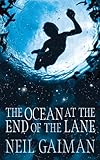
I thought, from the little I'd seen written about it, that I was about to read a horror fantasy. Lesson to self. Never believe anything someone else writes about a book. Especially never believe the cover blurb.
Oh yes, describing this book you could write of strange creatures from dark places beyond our world. Eldritch folk with weird and powerful knowledge. A slumbering Evil awakened. Death and Loss and Despair. It would all be true. But it wouldn't be _true_.
The book is a fable of Life and Love. Of care for ordinary things that matter. Of Birth and Healing and Hope. Of fresh starts and second chances.
It's about growing up and the journeys of life. It's about wisdom and folly.
What's it like? It's like Tolkien had asked Alan Garner to write the story of Tom Bombadil saving the Hobbits in the Old Forest.
But my advice is based on Mrs Hempstock's "you'll not get any two people to remember anything the same, whether they were there or not." Never believe anything someone else writes about a book. Even me.
Read it for yourself, and decide whether what I've written is true. Or if it's _true_.
The Ocean at the End of the Lane on AmazonLittle Brother
Little Brother (Little Brother, #1) by Cory Doctorow
Reviewed: 2013-12-01, 00:00, My Rating: 4.0 out of 5, review contains spoilers: No

The message is right on - the tension between security and comfort is as much a part of the war on terror as it is a part of the whole internet experience, or paying for goods, or just getting through your own front door. There comes a point where increasing security - to preserve your freedom - you actually relinquish your freedom, and you become worse than the threat you feared.
Little Brother takes the reader through that dilemma, in a well thought out way. Sadly the technology is complex, as are some of the concepts of security (both physical and cyber) and we end up with a few too many infodumps along the way.
The tension builds nicely through the book, but you do wonder how the protagonist is going to triumph over the villains, even with his greater understanding of cyberspace - and that's a good thing. A good novel should never look like a cakewalk for the protag. Unfortunately the poor protag falls into the villains' clutches a second time, and it really does look to be all over, until the cavalry ride over the hill. Then it's celebration and fireworks, yet somehow the villains escape justice, setting up for a sequel. It all happens a bit too quickly, and feels rushed, else I'd have happily given 5 stars. After all, I don't mind pat endings - they're what this genre is all about - it's just that I was disappointed that the ending was so patently "and they all lived happily ever after - until the next crisis". I did see the protag grow and change through the book, but in real life, there so often a price to pay, and the protag didn't pay it. The cost was entirely borne by the minor characters.
Little Brother (Little Brother, #1) on AmazonHannibal: Enemy Of Rome
Hannibal: Enemy Of Rome by Leonard Cottrell
Reviewed: 2013-11-30, 00:00, My Rating: 4.0 out of 5, review contains spoilers: No

Hannibal was wonderful, he so nearly beat the boring Romans. Before I found this book, sometime in the mid-seventies, the only thing I knew was a that he'd taken elephants over the Alps, on the basis of which, I undertook a school project on Hannibal.
Yes, it's probably unbalanced, pro-Hannibal in the extreme, but it was well written, and caught my schoolboy imagination. Who knows what happened to that first copy (library book, perhaps), but I went looking for it forty years later and found it every bit as readable, as engaging now as then.
Hannibal: Enemy Of Rome on AmazonAltered Carbon (Gollancz Sf S.)
Altered Carbon by Richard K. Morgan
Reviewed: 2013-11-20, 00:00, My Rating: 1.0 out of 5, review contains spoilers: No

Some of the ideas were fine. The violence totally spoiled it. At the end I felt polluted by it.
Altered Carbon on AmazonDecipher
Decipher by Stel Pavlou
Reviewed: 2013-11-20, 00:00, My Rating: 1.0 out of 5, review contains spoilers: No

The protagonists were too flawless, the science was implausibly deformed to fit the plot.
It felt like it had been written with too close an eye on the movie rights, and I admit it would make quite a reasonable techno-thriller, that would sit happily alongside (say) "2012".
Decipher on AmazonLife of Pi
Life of Pi by Yann Martel
Reviewed: 2013-11-19, 00:00, My Rating: 3.0 out of 5, review contains spoilers: No

I read it because I'd seen the film. I was expecting more divergence than is normally the case. The film has startling imagery; the book has excellent prose description to balance, though they do not always match. Details differ (e.g. the fate of the diary), but not disconcertingly so, and the weight given to various spans of time also differs between film and book. The character of Pi is an unusual one - not very "traditional Indian", but the contrast with his family is important to the story, so I don't quibble there.
I was going to compare it with Paul Coelho's "The Alchemist ", but it is far superior to that dismal fable. Better might be to compare it with (say) Primo Levi's account of his life in a concentration camp "If this is a man ", both telling of how a man might lose so much of his civilisation in a hostile environment, yet retain aspects of humanity.
One might contend that Levi's work is "true", whereas Martel's is fable (and therefore innately "lesser"). However, Martel echoes Pilate's question: standing before God - What is truth? Which of Pi's stories is the true one? Martel contends that it doesn't matter if both tell a similar tale of the heart. Pi knows that God is not fooled, but may still be more amused by the "story with animals".
I too was amused, and intellectually provoked, by this story, but it doesn't feel like a book to which I'll return.
Life of Pi on AmazonWar with the Robots
War with the Robots (Science Fiction) by Harry Harrison
Reviewed: 2013-11-18, 00:00, My Rating: 4.0 out of 5, review contains spoilers: No

While all of the stories in this collection are good, there is one that for me is a standout story of the robot SF genre, namely The Velvet Glove, published in 1956. Set in context, that's just a couple of years after Asimov's "The Caves of Steel ". Harrison takes the next step, writing the story from the point of view of its robot protagonist (Jon Venex), but his target is surely the racism of the time, and his question is clearly "What is a man?".
It's not only a political statement, but a (short) crime thriller in its own right, and one in which the robotic nature of the protagonist is central to the plot. For many years, for me at least, this was the story against which all other robot stories were judged.
To be fair, the other stories are very good as well (though the robots are mostly more robotic, or more computer-like). It's just that none of them has stayed with me quite as enduringly as Jon Venex.
War with the Robots (Science Fiction) on AmazonA Midsummer Tempest
A Midsummer Tempest by Poul Anderson
Reviewed: 2013-11-16, 00:00, My Rating: 5.0 out of 5, review contains spoilers: No

Don't look for anything too deep, here. This is just Poul Anderson playing with ideas and spinning a delightful yarn.
It's one I come back to and read again from time to time, and I read it with a smile on my face.
A Midsummer Tempest on AmazonDrive
Drive: The Surprising Truth About What Motivates Us. Daniel H. Pink by Daniel H. Pink
Reviewed: 2013-11-06, 00:00, My Rating: 5.0 out of 5, review contains spoilers: No

Interesting theory, you might ask, but does it work?
The book, I think, has two potential audiences. The first is any individual who feels unfulfilled in their job. The second is any people manager / leader.
So I'm reviewing this book a couple of years after reading it, and having had time to integrate its tenets into my work life, and also to examine my level of motivation, and those of my team members.
At a simplistic level, I'm happy when I'm being creative. My team members are happy when I set broad overall goals, but leave them the autonomy to achieve those goals in a creative way (or in a way that builds mastery). Empirically, the book makes sense.
I moved into a new area, where I did not have "mastery" (which (according to Pink) along with autonomy and purpose forms the basic for motivation), and I observed my motivation decrease. So I looked for a small, related area to work on, to develop mastery, and motivation improved (I wanted to go into work again). Yep, the book checks out.
So when evaluating the book, I start with the personal observation that a couple of years implementing the ideas has borne fruit, both for myself and for my team. That accounts for most of the stars.
Some reviewers take exception to the amount of repetition, in that the ideas are so simple that they can be stated in a page (or less, which Pink does), yet Pink takes a whole book, to state them and restate them at ever greater depth. I prefer to commend this approach, on behalf of busy people everywhere who need a quick summary, to inform them what they'll get out of reading this book, but can then go on to explore the concepts and the evidence at a series of graded levels.
So yes, readable, digestible, actionable, challenging and intellectually interesting. This book is all of those.
Drive: The Surprising Truth About What Motivates Us. Daniel H. Pink on AmazonThe Wooden Horse
The Wooden Horse by Eric Williams
Reviewed: 2013-11-01, 00:00, My Rating: 5.0 out of 5, review contains spoilers: No

There are two significantly different versions of this book. Eric Williams' original 1949 edition was written while military censorship was still in force, and is a simpler story, built around simpler characters.
In the 1979 edition, Williams sets the records straight on (particularly) one event that was invented to make a better ending for the 1949 book. The rest of the book is significantly revised and expanded, also, and the PoWs' language becomes less "comic-book" and more (one assumes) true to life.
Read the 1979 revision if you want the actual story - the 1949 is more like a Boys' Own adventure.
The Wooden Horse on AmazonWings Day
'Wings' Day by Sydney Smith, DFC
Reviewed: 2013-10-30, 00:00, My Rating: 4.0 out of 5, review contains spoilers: No
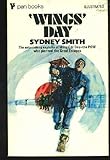
Originally published in 1968, this biography of Wing Commander Day (RAF) focuses entirely on the war experiences of his subject, captured in the early days of the war, and spent the next five and a half years as Senior British Officer (SBO) in various POW camps, but not above joining escapes himself.
After taking part in the Great Escape, Day was recaptured and transferred to Sachsenhausen concentration camp, from which he also escaped.
The book is written as a story, rather than as a work of scholarship, and the back cover notes that the author, Sydney Smith (Squadron Leader Eric Sydney-Smith RAF), was imprisoned alongside Day for four years. So the author's first-hand knowledge both of Day and of the experience of the POW comes through strongly.
However Smith very much tells Day's story, not his own. Dates are not important for Smith - you can read pages without knowing more than the year or the season when these events took place.
At times the view is the somewhat abstract view of a high-ranking SBO, but the narration of the experience of Sachsenhausen is deeply personal.
Recommended.
'Wings' Day on AmazonThe Great Escaper: The Life and Death of Roger Bushell: Love, Betrayal, Big X and The Great Escape
The Great Escaper by Simon Pearson
Reviewed: 2013-10-29, 00:00, My Rating: 5.0 out of 5, review contains spoilers: No

I've been waiting for someone to write this book for forty-plus years, and Pearson's book does not disappoint.
Inevitably it covers much of the same ground as the three books that - to my mind - introduced Roger Bushell to my/Pearson's generation. Pearson openly acknowledges his debt to those books - The Great Escape (Paul Brickhill), 'Wings' Day (Sidney Smith) and Escape From Germany (Aidan Crawley). But in these books - great as they are - Bushell appears in his final form, a lion already caged, with little information of what formed this great, but arguably flawed leader of men.
Pearson's great achievement is that he shows the making of the man, through the words of those who knew him. Pearson admits that luck played a part - doors opened for him to meet a few survivors of the Great Escape, and at a time when the family was making Bushell's papers available.
It is a scholarly work, with 15-20% devoted to a thorough bibliography and cross-reference to his sources. At the same time, it is a thoroughly readable story, too, capturing the moods of the man through the letters he wrote, and revealing much that was not known (or could not be published) at the time of those earlier books. In that vein, I'd particularly commend the research into Bushell's time in Prague, sheltered by Czech Resistance, as being pivotal in bringing new insight into the man, and the events that moulded Bushell into his final form - the Bushell of the Great Escape.
If you ever read PoW tales, then you'll have got a glimpse of Bushell and wanted to know more. For more than sixty years Bushell's life story was begging to be told, and now it has been.
Go read it.
The Great Escaper on AmazonThe Road to En-Dor
The Road to En-dor by Elias Henry Jones
Reviewed: 2013-10-28, 00:00, My Rating: 3.0 out of 5, review contains spoilers: Yes
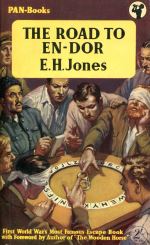
It's easy to think that British WWII POWs invented escape, and the escape story. This story dates from the Great War and arguably inspired several of the next generation of escapers.
The escapers chose the deception route to gain their freedom, with an astounding patience and willingness to replan as successive attempts were thwarted.
The language is very much of its time - the book was published in 1919 - but manages to convey the agonising frustrations and delays endured by Jones and Hill, while still moving the story on with sufficient pace.
The book stands on its own as a (true) escape story, while also shedding light on the heritage of the WWII escapers, who were so much better prepared because, in part, of this book.
The Road to En-dor on AmazonFree as a Running Fox
Free As a Running Fox by T.D. Calnan
Reviewed: 2013-10-28, 00:00, My Rating: 4.0 out of 5, review contains spoilers: Yes
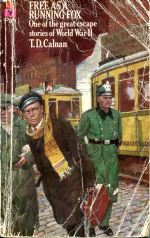
This is perhaps one of the lesser-known WWII escape tales, though Tommy Calnan's tale forms part of the fascinating saga of British and Allied airmen in the Stalag Luft III compounds.
In its pages we meet again Eric Williams and Mike Codner of the Wooden Horse escape, and other names - Charlie the "ferret" - that have entered the lore of Stalag Luft III. Of the Great Escape of the North Compound little is said, but it is clear that the East Compound inmates knew quickly of that escape, and learned with horror of the fate of the fifty who were recaptured and shot.
Calnan tried many escapes, and his story typifies the attitude of many airmen of that time, committed to escape both for personal and for military reasons.
The story was published much later than the "classic" tales that surfaced in the forties and fifties, but still feels cut from the same cloth.
Free As a Running Fox on AmazonNightmare Blue
Nightmare Blue by Gardner R. Dozois
Reviewed: 2013-10-19, 00:00, My Rating: 4.0 out of 5, review contains spoilers: No

This has been in my collection a long time, and is one I come back to from time to time. The Blue of the title is a drug , instantly addictive, and withdrawal means death.
Who's pushing it, and why?
There are aliens, so it's no great leap to guess they're involved. But there's also opposition to the protag's investigation from the human authorities, so there's no support to be had there.
It's quite dystopian - the writing evokes sleaze and a broken society, and while you hope for a happy ending - there's a race against the clock going on - there's nothing in the author's style that promises you'll get one.
So yes, it's an adventure/thriller, more like the Big Sleep than the Thirty-Nine Steps . The aliens are unimportant in one sense - writing the novel today you could easily substitute terrorists or an unfriendly nation with strong science, and tell much the same tale.
Nightmare Blue on Amazon